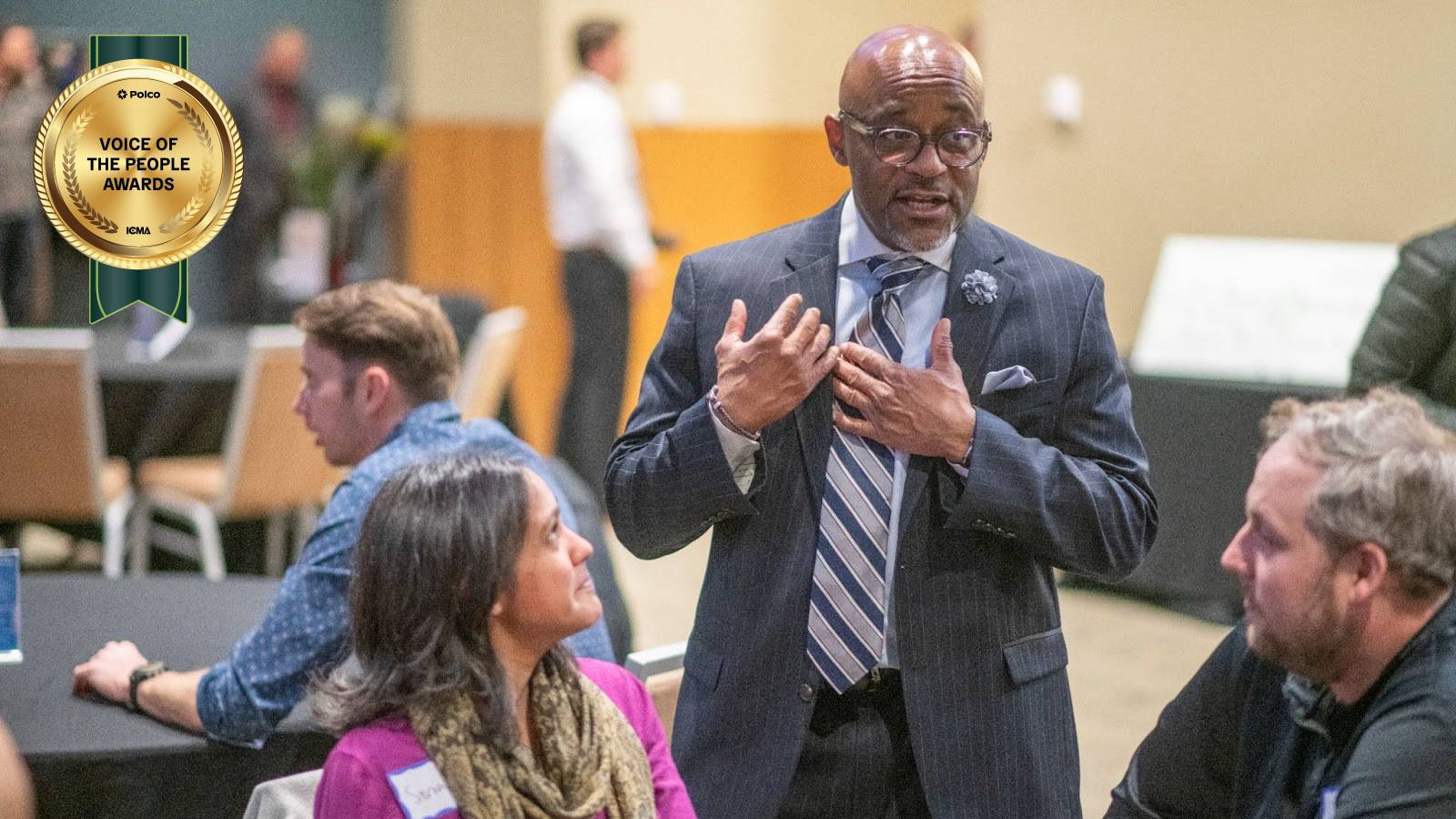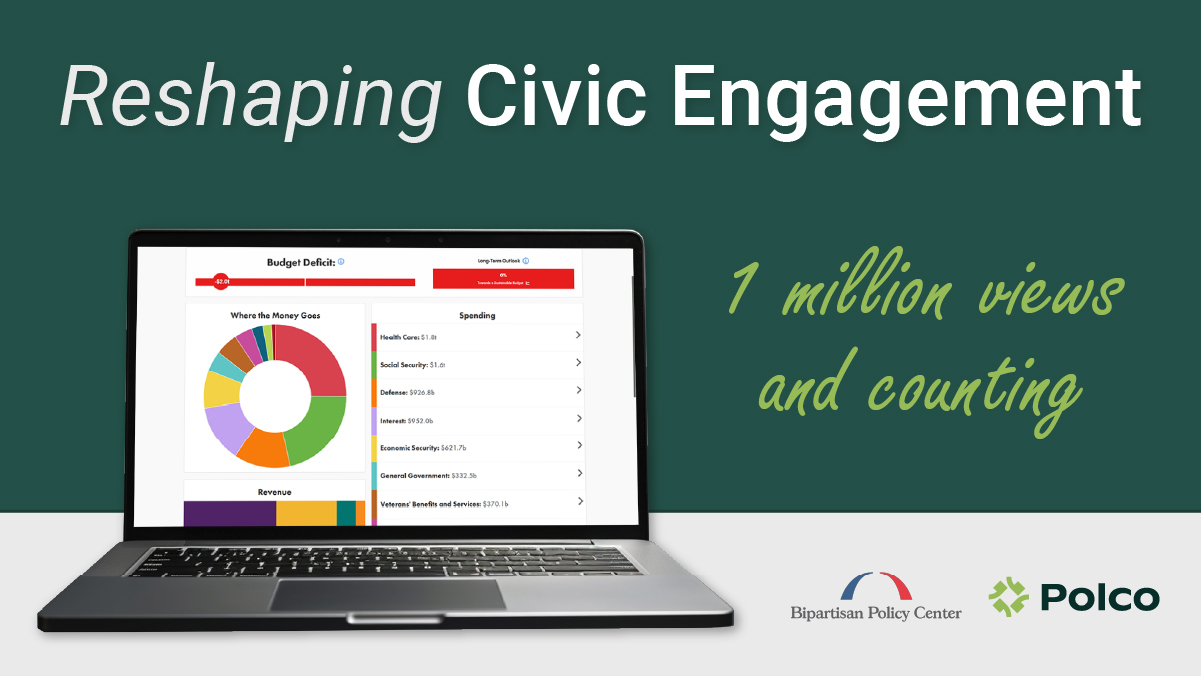Denver Gives Residents $2 Million To Spend With Participatory Budgeting
By Polco on October 26, 2023

Pictured above: Denver Mayor Michael Hancock at a participatory budgeting session.
Denver’s tech-enabled participatory budgeting program helps underserved neighborhoods gain $2 million for safety, community and homelessness.
The City and County of Denver is using an innovative blend of tech and in-person outreach to tune in to residents who don’t typically have the ear of local government: young people, undocumented residents, people experiencing homelessness, communities of color, and more.
"Let’s Budget, Denver,” a participatory budgeting program that launched in 2021, is enabling Denver residents in historically underserved communities to direct $2 million in public dollars toward infrastructure projects in their neighborhoods — and that isn’t even the primary goal.
“Most importantly, the city is building more authentic relationships with residents and slowly rebuilding trust within our neighborhoods,” said Kiki Turner, Deputy Director of Communications and Public Affairs for the Department of Finance at the City and County of Denver. “Ultimately this program helps develop a more engaged society and a stronger democracy here in Denver.”
The Roots: What Is Participatory Budgeting?
Participatory budgeting traces its roots to Porto Alegre, Brazil, where it was first implemented in 1989, and today is used by cities across the United States and the world. A democratic process, participatory budgeting gives ordinary community members real power over real money, usually a small portion set aside as discretionary funds from a local government’s annual budget. Residents then direct how those public budget dollars are spent, which is different from a normal budget process led by elected officials and city staff.
Participatory budgeting can help communities develop leadership and promote learning, collaboration and civic engagement. Many residents, however, aren’t aware of it, or know how it works. That may be changing, however, as digital tools make it easier to implement and reach more people, as it has in Denver.
The Pilot: Participatory Budgeting in Denver
Denver’s participatory budgeting program is supported by the nonprofit Participatory Budgeting Project, which works with communities across the US and Canada to decide together how to spend public money.
Although just a fraction of Denver’s $3.75 billion 2023 total budget, the participatory budgeting program’s $2 million was a catalyst to bring together community members of all ages and backgrounds to design and narrow down options for projects. Denver’s effort was led by a community steering committee that set rules and encouraged fellow residents to get involved. During the proposal development phase, volunteers (known as Budget Delegates) served a critical role building the ballots for voting on the $2 million. Budget Delegates met weekly from August through mid-October 2022 to rank project ideas and work with city staff to develop concrete ballot proposals. All resident volunteers received a small stipend for their work.
To achieve equitable engagement, leadership positions aimed to overrepresent communities that face higher barriers to civic participation, including people of color, immigrants and refugees, youth, and persons with disabilities. Other supports, such as childcare, enabled a more inclusive process. In addition, mini grants to organizations helped fuel engagement.
“In the pilot year, our goal is to foster collaboration between communities to develop inclusive, thoughtful investments together,” Turner said. “A big part of reaching that goal is creating a civic process that is accessible and engaging … dare I say, fun.”
The Engagement: Denver's Participatory Budgeting Citywide Ballot
More than 60 community members served in various leadership roles to carry out different stages of the program, including establishing the rulebook and leading outreach to gather over 1,100 ideas from Denver’s historically underserved communities. Residents then prioritized the ideas and developed 23 specific project proposals across four ballot areas, each with its own budget:
- A citywide ballot for all other areas in the city with a budget of $1M for residents who live or go to school in all other areas of the city
- A far northeast Denver ballot with a maximum budget of $400K for residents living in Montbello or Green Valley Ranch/Gateway
- An east Denver ballot with a budget of $300K for residents who live or go to school in East Colfax, Montclair, Hale, or South Park Hill
- An east central Denver ballot with a budget of $300K for residents who live or go to school in City Park, City Park West, Congress Park, Cheesman Park, Capitol Hill, or North Capitol Hill
As an example of possible projects, the Citywide ballot included:
- Wider and more accessible sidewalks for people with disabilities and older adults
- Tiny homes for people experiencing homelessness
- More shower trailers for Safe Outdoor Spaces to support people experiencing homelessness
- Cleaner parks, stronger minds and cleaner air for Five Points and surrounding neighborhoods
- Light signal safety for people with disabilities
- Community gardens for subsidized housing areas
- Drinking fountains in northwest Denver parks lacking public water
- Outdoor fitness equipment for older adults
The Vote: The Tech Behind Participatory Budgeting
In Fall 2022, residents voted on the proposed projects using connected devices to access Balancing Act from Polco, a Denver-based maker of software for simulation-based public engagement, as well as through paper ballots, where needed.
Balancing Act’s Prioritize tool provided a nimble solution for adapting four different digital ballots translated into eight different languages. The user-friendly simulation displayed images showing the infrastructure types, costs and additional details. Non-English-speaking voters could access the simulation via their language, and each voting choice allowed comments. After users selected their priorities for funding, they could rank them, and submit optional demographic information.
To support equity goals, voting events took place in unconventional places, including the Denver County Jails to reach currently incarcerated individuals and Denver’s Safe Outdoor Spaces to reach people experiencing homelessness. Youth also had the opportunity to develop their civic skills through voting events at elementary schools where hundreds of third, fourth, and fifth graders learned about the process, discussed projects and cast their ballots.
“Over the past year, our residents weighed in and worked alongside their city government to be part of a solution,” Mayor Michael B. Hancock said. “This is the kind of collaborative mindset that spurs equitable investments and lasting progress in our city.”
The Results: How Denver Spent the Money
During the month-long voting period in November 2022, residents cast more than 3,100 digital and physical ballots. After counting rank-choice ballots, and in accordance with the resident-developed rulebook, nine projects—ranging from light fixtures and trash cans to wider sidewalks and tiny homes—will receive the combined $2 million and begin design and construction this year.
“The Prioritize tool from Balancing Act helped us to make the voting phase feel more dynamic, modern, and community-led,” Turner said. “The tool allowed us to be adaptable and bring the civic process out into the community, making it easy for a wider variety of participants. Using tablets and smartphones, we were able to walk people through the process and allow them to vote while in neighborhoods visiting food banks, homeless shelters, youth centers, affordable housing complexes, schools, jails, etc. The multiple languages also allowed us to reach more participants and easily navigate ballots in eight different languages.”
Denver Wins an Award for Participatory Budgeting
Related Articles
Popular posts
Sign-up for Updates
You May Also Like
These Related Stories

5 Game-Changing Ways Local Governments Are Using Data

Transforming Public Finance: Embracing Rethinking Budgeting Principles

